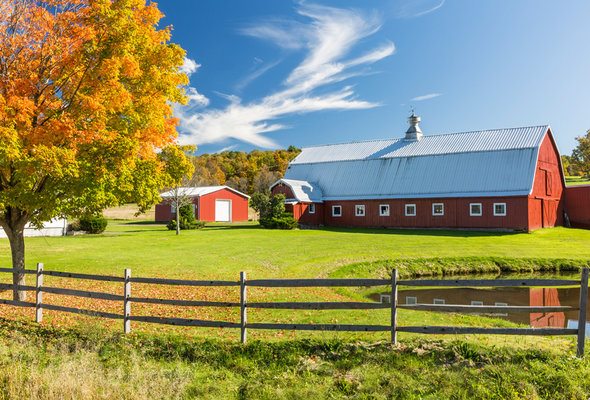If you own a home, you’re no stranger to property taxes. There are property tax breaks for seniors, people with disabilities and other protected classes, but did you know that there are agricultural tax exemptions, too? If some of your land can be classified as farmland, you could reap significant tax savings.
For professional help to guide you through the ins and outs of agricultural tax exemptions, talk to a financial advisor.
Understanding Agricultural Taxes
If you’re a farmer, you’re no doubt familiar with the complicated tax landscape for farmers in this country. You may even use a tax accountant to help you get as many tax breaks as you can. If you can prove that you farm as a business and not just for recreation, you can get both property tax breaks and income tax breaks.
However, you don’t have to be a full-time farmer to benefit from agricultural tax breaks. In some cases, all you need is a piece of land that’s not currently in use. You can say that the land is preserved wilderness, or you can use it for an agricultural purpose in order to receive the tax benefits.
The size of agricultural property tax exemptions varies from state to state because property taxes aren’t administered at the federal level. Qualifications for agricultural tax exemptions vary from state to state, too. Some states base eligibility on the property’s size, while others set a minimum dollar amount for agricultural sales of goods produced on the property. Many use a combination of gross sales and acreage requirements.
Grazing a single cow on your property can be enough to trigger tax breaks in some places. If you qualify, an agricultural tax exemption could knock thousands off your property tax bill.
Depending on your state’s rules, one way to execute this tax strategy is to offer use of your land to a local farmer. For example, you could allow a nearby farmer to harvest hay on acres you’re not using or rent your land to a farmer. You don’t necessarily have to do the work yourself to claim the exemption for your property. You may, however, have to renew your application for a farm assessment each year, depending on your local tax assessor’s rules and state requirements.
Abiding By Tax Laws

If you are not a full-time farmer, it is important to pay careful attention to eligibility requirements before claiming an agricultural exemption.
For example, if you sell an agricultural product grown on your property (such as jam, honey, vegetables, eggs from chickens, or flowers), you might need approval from your local health department. Depending on zoning rules or homeowners association rules, you may not be able to plant a vegetable garden or sell items from your residential property at all, even with a business permit. Enlisting the help of a tax accountant can help you navigate the rules surrounding agricultural tax exemptions.
Keep in mind that taking your land out of agricultural use can result in a bill for back taxes. For example, if you decide you no longer want to rent your land to a farmer or grow veggies on your acreage, the state may require that you pay back the taxes that were exempted in previous years.
For example, the State of New York warns residents of the following: “If farmland that has received an agricultural assessment is converted to a nonagricultural use (within five years of last receiving an agricultural assessment if located in an agricultural district and within eight years if located outside an agricultural district), a payment to recapture the taxes forgone for converting such land will be imposed.”
Furthermore, the state charges a conversion charge if you take your agricultural land and convert it to another use, rather than letting it lie fallow. This charge is equal to five times the taxes saved in the most recent year that the land received an agricultural assessment.
There’s an exception if the land is given over to resource extraction (such as natural gas). However, the lesson here is that it’s important to consider both the tax implications of applying for an agricultural tax exemption and the potential tax exemptions that could arise if you change your mind about the agricultural use of your land.
Documentation to Qualify for an Agricultural Exemption
Applying for an agricultural tax exemption generally requires more than simply stating that land is being used for farming.
Local assessors typically expect clear documentation showing that the property meets the state’s definitions of agricultural use. This can include proof of livestock, crop production, hay harvesting or other qualifying activities, even if those activities take place on only part of the property.
Many states also require evidence of income or production levels. This might involve sales receipts for agricultural goods, lease agreements with farmers or written contracts for activities like grazing or hay cutting. Some states set minimum annual revenue thresholds, while others require only that the land be actively used for agricultural purposes during the tax year.
In addition to income and activity records, landowners may need to provide maps, photos or management plans as part of their application. Timberland, conservation land and pastureland often requires written land-use plans that describe how the property will be maintained. Counties may also request proof of acreage, boundary descriptions or updated parcel information to confirm eligibility.
Many states require homeowners to renew their exemption each year. Renewal forms often ask for updated production totals, continued proof of agricultural use or verification that lease agreements remain in place.
Keeping records organized and readily accessible can help avoid delays so you can meet assessor requests and maintain compliance with state and local requirements.
Bottom Line

If real estate taxes are eating up a big part of your budget, it may be worth exploring your options for an agricultural tax exemption. However, it’s important to meet the eligibility requirements as outlined by the federal, state and local governments. It’s also a good idea to document any agricultural sales from your property and save those records in a safe place.
If you have any questions, don’t hesitate to contact a financial advisor for help.
Tips on Real Estate
- A financial advisor can work with you to set and reach your financial home-buying goals.
Finding a financial advisor doesn’t have to be hard. SmartAsset’s free tool matches you with vetted financial advisors who serve your area, and you can have a free introductory call with your advisor matches to decide which one you feel is right for you. If you’re ready to find an advisor who can help you achieve your financial goals, get started now.
- If you want to switch from renter to owner, you may want to know about loan programs for first-time buyers. Generally, this program helps people with less-than-excellent credit scores or who can’t make 20% down payments.
- If you want to know how much house you can afford, SmartAsset’s free home buying calculator can help you break down mortgage payments, property tax, insurance and other costs based on your income, location, and other relevant financial information.
Photo credit: ©iStock.com/valentinrussanov, ©iStock.com/lightphoto, ©iStock.com/Redrockschool
